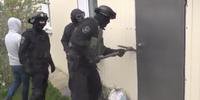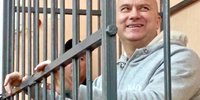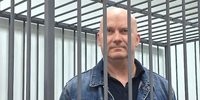The Case of Klimov in Tomsk
Filter
- #
Long before the initiation of a criminal case, the judge of the Tomsk Regional Court, Andrei Goncharov, allowed the Center "E" to carry out operational search measures against Sergey Klimov: wiretapping telephone conversations and removing information from technical communication channels.
- #
Investigators establish that believers meet from time to time to pray and discuss biblical topics.
- #
The Tomsk Regional Court allows the special services (Center "E") to establish secret surveillance in the apartment of one of the believers in Tomsk.
Surveillance and secret audio recording of conversations between Klimov and his acquaintances are being conducted.
- #
A criminal case has been initiated on the organization of extremist activities against an unidentified person. On the same day, the court authorizes a search in the apartment where Sergey Klimov and his wife Yulia live.
- #
In Tomsk, raids on believers begin, a series of searches, detentions and arrests take place. Among the dozens of detainees is an 83-year-old woman, a minor, and an informant collaborating with the security forces, a man who pretends to be interested in the Bible and provoked believers to talk about religion.
- #
Sergey Klimov was detained and interrogated. He was charged with organizing the activities of an extremist organization.
- #
The court decides to arrest Sergey Klimov for 2 months.
- #
Yulia Klimova, together with other wives of citizens arrested for their faith, sends an open collective letter to the Head and all members of the Presidential Council for the Development of Civil Society and Human Rights. The letter begins with the words: "An open letter to you is our cry of despair. Our dear people ... thrown behind bars on suspicion that they read the commandments of the Bible with us, with our children and friends, and prayed to God."
- #
The Presidential Council for the Development of Civil Society and Human Rights responded to the appeal of the wives of citizens arrested for their faith. An appeal was sent to the Prosecutor General's Office with a request to verify the legality of the criminal prosecution of Jehovah's Witnesses.
- #
The court extends the detention of Sergey Klimov for a month.
- #
The detention was extended for another two months.
- #
The court again leaves Klimov in custody for two months.
- #
The next extension of detention is for another two months.
- #
The court decides that Klimov will remain in custody until April 28.
- #
The court leaves Klimov in custody until May 28. The preliminary investigation has been completed, Klimov is beginning to be acquainted with the materials of the criminal case. In the near future, the case is expected to be sent to court for consideration on the merits.
- #
The criminal case was received by the Oktyabrsky District Court of Tomsk. In court, the case was assigned the number 1-417/2019. Stage - proceedings in the court of first instance (trial).
- #
- #
Judge Dmitry Borisov ordered the extension of Klimov's detention for 6 months, until November 28, 2019, rejecting the defense's request to change the measure of restraint, and scheduled a preliminary hearing.
- #
Judge Dmitry Borisov held a preliminary hearing of the case in a closed court session and refused the defense's petitions to terminate the criminal case, to return the case to the prosecutor, and also refused the defense's application to challenge the judge.
- #
The judge of the Tomsk Regional Court, Dmitry Yukov, dismissed the appeal of the defense to extend the period of detention, having considered it without the participation of the defendant.
- #
Judge Dmitry Borisov held the first hearing on the merits of the case. He rejected the defense's request that the believer Klimov be outside the cage during the court hearings, together with his lawyer. State prosecutor Kalinina D.V. announced the indictment.
- #
Judge Dmitry Borisov questioned A.S. Dudko, an operative of the CPE of the Ministry of Internal Affairs of Russia for the Tomsk Region, who had been conducting operational-search measures (ORM) against Klimov and other believers even before the official publication of information about the inclusion of the local religious organization of Jehovah's Witnesses "Severnaya, Tomsk" in the list of extremist organizations. A court hearing will be held on July 11, 2019, during which the judge will continue to question prosecution witnesses.
- #
Two police witnesses were questioned. The first confirms that Klimov talked to others on religious topics, and the main idea of Jehovah's Witnesses is that "Jehovah is the true God." It is difficult to explain the arguments of the prosecution. The second agrees that a denomination and a legal entity are not the same thing.
- #
Two witnesses were questioned. One of them mentions that he signed his testimony given during the investigation without reading it, and cannot vouch for the correctness of the information contained in the interrogation protocol.
- #
A witness whose testimony also disagrees with the previous interrogation protocol is questioned. The woman cannot say anything bad about Jehovah's Witnesses, she has never noticed aggression in their actions.
- #
Three prosecution witnesses were questioned. The first reports that he has never communicated with Jehovah's Witnesses. He also makes a statement that he had not previously given any testimony, despite the presence in the case file of the protocol of his interrogation. The second witness has attended meetings of Jehovah's Witnesses several times and considers them to be affable, good people who do not teach anything bad. Investigator Ivan Vedrentsev cannot explain the reason for the discrepancies in the protocols of interrogations of witnesses with their testimony in court.
- #
A secret witness who claims to have attended meetings of Jehovah's Witnesses for 5 years is being questioned. He is in the next room and refuses to answer most of the questions of the lawyer and the prosecutor, citing the fact that he does not want to do so. According to the witness, Sergey Klimov is the leader of the local believers.
- #
The prosecutor petitions for consideration of materials from 8 volumes of the case, including the results of examinations of electronic devices and materials related to the surveillance of believers. The court considers the materials of the case.
- #
The prosecution has completed the presentation of evidence. The defense petitions for the declassification of the secret witness and a new interrogation. The court rejects the request.
- #
The defense provides the court with evidence that Sergey Klimov was not a member of the liquidated local religious organization, and acquaints the court with the positive results of the linguistic analysis of the publications of Jehovah's Witnesses. The court refuses to attach these documents to the case file.
- #
A specialist in the field of religious studies was questioned at the hearing. He explains the difference between canonical (spiritual) and secular structures. Indicates that acceptance of the faith of Jehovah's Witnesses does not require affiliation with any legal entity, but is solely an act of a religious nature. The practice of religion in a given denomination is not made dependent on affiliation with any registered organization, but is considered as a personal right to choose religion.
The defense is interrogating Sergey Klimov's wife, Yulia. They have been married for 30 years. Through joint Bible study, their marriage is strong and happy. According to her, Sergey is a very kind person and has nothing to do with extremism.
- #
The court supports the prosecutor and refuses the defense to re-summon the alleged "secret witness", as well as to appoint a linguistic examination.
The lawyer interrogates the defendant's sister, who characterizes Sergey Klimov on the positive side. The defense asks to consider the material evidence in the case in court. Despite the fervent objections of the prosecutor, the court grants this request.
- #
Material evidence in the case is considered: books, films, cartoons, documents, including religious studies about Jehovah's Witnesses by third-party scientists. From beginning to end, the court watches a film about the Bible, excerpts from religious literature are read. All the evidence presented shows that Sergey Klimov did not organize the activities of any extremist organization and did not promote extremist views.
- #
Klimov once again explains the difference between the concepts of "organization" and "religion", adding that extremism is alien to Jehovah's Witnesses. Believers gather because they are prompted to do so by faith. The appropriation of donations by one of the believers is slander. Declares that he wants to use article 47 of the Code of Criminal Procedure of the Russian Federation, which allows him to object to the charges, testify on the charges or refuse to testify.
- #
The parties complete the presentation of evidence. The court proceeds to the stage of deliberations. The next meeting is scheduled for September 10, 11:00.
- #
The case is moving to the stage of debates, but the prosecutor's office is asking for more time to prepare for them.
The next meeting will be held on October 21 at 11:00.
- #
Speaking during the debate, the prosecutor explains how, in his opinion, giving speeches on biblical themes and singing songs is an attack on the constitutional order of the state. The prosecutor's office asks to appoint the defendant 7 years in prison.
The next meeting will be held on October 28.
- #
The judge rejects the motion to film media representatives during the court hearing.
Speaking in the debate, lawyer Leontiev draws attention to the fact that: the prosecutor's office and the investigator base their judgments in the Klimov case on the testimony of a secret witness, but these testimonies prove his cooperation with law enforcement agencies, since there is a clear correspondence between his words and the text of the certificates signed by law enforcement officer A. S. Dudko; the defendant is a member of the international confession of Jehovah's Witnesses, and not of any legal organization banned in the territory of the Russian Federation, and only professed his religion together with fellow believers; Klimov's accusation of distributing materials from a banned Internet resource is unfounded, since there is no evidence that the seized publications were downloaded from the banned site; there are no facts of storage and distribution of prohibited literature; there is no evidence of the defendant's criminal intent; previous court decisions do not prohibit the practice of the religion of Jehovah's Witnesses; Conviction in the correctness of one's religion cannot be considered extremism. Draws attention to the decisions of authoritative international bodies in favor of individual Jehovah's Witnesses. Asks to acquit the defendant.
The next meetings are scheduled for October 30 and November 5.
- #
Speech by lawyer Artur Leontiev defending Sergei Klimov - #
The debate of the parties continues. The defendant takes the floor. He explains why the accusations against him are unfounded.
- #
Speech in the debate by Sergei Klimov - #
Sergey Klimov makes his final statement. Then the court passes a guilty verdict: 6 years in prison, 5 years of ban on engaging in educational activities and publishing on the Internet, plus another 1 year of restriction of freedom.
- #
Sergey Klimov's last word - #
A panel of judges of the Tomsk Regional Court, composed of Chief Justice Andrey Arkhipov and Judges Dmitry Yukov and Elena Ilyina, upheld the brutal sentence of a 49-year-old Jehovah's Witness. The verdict has entered into force. Sergey Klimov will go to a penal colony for 6 years for his faith. However, Klimov will seek the cancellation of the unjust verdict and subsequent rehabilitation.
- #
Sergey Klimov was transferred from the pre-trial detention center to correctional colony No. 8 in the Astrakhan region (50 Sovetskaya Gvardia St., 414044 Astrakhan). At the moment, he is in quarantine, so relatives cannot visit him.
- #
"A black robe with a patch, a bag of papers, and a smile of joy that he has a visitor. This is how Sergey appeared to me after a few months of his stay in the colony after being transferred from Tomsk. This is how his lawyer describes the meeting with Sergei, who managed to visit the believer in the place of detention in August. She is the only one who was allowed to see him in the colony for many months.
Sergey Klimov has been imprisoned for about 2.5 years. He is serving time in a barracks for about 30 people. In the colony, his eyesight has deteriorated, so it is difficult for him to respond to letters of support. Although they come in hundreds, they give Sergey only 2-3 letters a week.
"Camp staff and convicts are surprised by the very large number of letters. The prisoners ask Sergey to read them aloud," says Yulia Klimova, Sergei's wife. The last time they saw each other was 8 months ago. So far, they have not been able to get a date, but they have the opportunity to sometimes call up on the phone.
In his free time, Sergey studies English. In August, the colony staff took the Bible from the believer, and it is not yet known whether it was returned or not.
In October, during a medical examination, Sergey was diagnosed with a dangerous lung problem. During the 3 weeks it took to complete the paperwork for hospitalization, the believer's health deteriorated markedly. On October 14, with a high fever, he was taken to Medical and Correctional Institution No. 7 by ambulance, where he is undergoing treatment.
- #
For the first time in 9 months, Yulia Klimova, Sergey's wife, is given a date with him, which lasts almost 4 hours. "For me, it was very unexpected, because I was no longer expecting dates in the near future," says Julia. According to her, Sergey looks slimmed down and somewhat tired. He has a Bible and a Bible symphony (a collection in alphabetical order of all the words found in the Bible), but it is difficult to create conditions for reading, since there are 480 prisoners in the colony. Letters of support continue to arrive in the colony, but they are rarely passed on to Sergei.
- #
From Medical and Correctional Institution No. 7, where Sergey underwent serious treatment for a month, he was transferred back to IK-8.
His wife Yulia reports that, in general, Sergey feels well, although his eyesight is deteriorating. She manages to give him medicines, as well as insect and mouse repellents. Bed linen and towels are not accepted. In the colony, Sergey learns woodworking.
- #
The lawyer visits Sergey in IK-8. The health of the believer still leaves much to be desired. His eyesight is deteriorating, and he recently had to buy new glasses.
According to the lawyer, Sergey's relations with his cellmates are respectful. One of the employees of the colony, in an interview with a lawyer, notes that Sergey is a normal, problem-free person, because he is imprisoned "for his convictions."
Sergey has a Bible. Letters, parcels and parcels arrive without delay.
- #
The Eighth Court of Cassation of General Jurisdiction, located in Kemerovo, is considering the cassation appeal of Sergey Klimov. 11 people come to support the believer, Klimov manages to talk a little with them while the judges are in the deliberation room.
The court dismisses Sergey's complaint. Thus, the verdict of the Oktyabrsky District Court of Tomsk of November 5, 2019 and the appellate ruling of the Tomsk Regional Court of February 20, 2020 remain unchanged. The believer will have to spend about a year and a half in the colony.
- #








